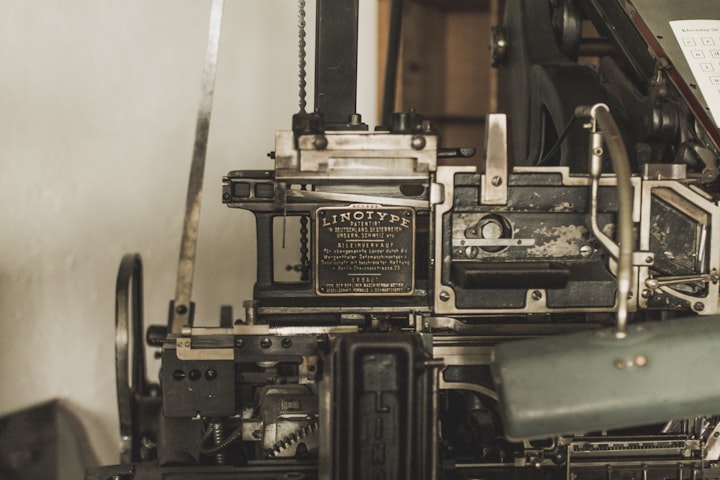Handling the Heat
Printing Was a Woman's World

Newspapers, catalogs, brochures, flyers, posters, banners, books, pamphlets, postcards, magazines, billheads, announcements, legal briefs - the written word, the printed word.
Everything changed with the printed word.
1886 - San Franscisco
The invention of the Linotype composing machine by Ottmar Mergenthaler. Oh, what a crazy man but a genius nonetheless. Creating one of the greatest advances in printing in the over 400 years such a thing has been around. With a 6,000-character output within an hour, such feats were about 3 times more than what a working man could do.
But, she was no man. With a knack for grammar and spelling, and of course, the manual dexterity needed; she excelled in typesetting and learning on the spot. And regardless of her paycheck being lower than her fellow male coworkers, regardless of whether unions tried to ban her and many other women, she loved her job with unabashed passion and joy.
Because she was needed and sought after. And that's what made everything worth it.
The Hesperian
Mrs. Hermione Day, her hero, her savior, her leader in typesetting, and continued publisher of the famous paper The Hesperian. It was here that she found talk of labor, the inequality of it, and the lack of opportunity for women. Of course, this was years before she began her journey into typesetting, but such feats were inspiring and beneficial for women like her.
The Pacific Monthly
Lisle Lester, oh yes she remembers this feisty and colorful character. Not as organized as Mrs. Day, but oh did she love reading Mrs. Lester's stories with a rhetoric that challenged and sought attention at both its best and worse. She had such strong opinions, but this did not last long, unfortunately. Going bankrupt in 1868, this is when she noticed a turning point taking place with the Women's Co-operative Printing Union's establishment. The first permanent foothold for women printers, such as her, in San Francisco. Here is when the seemingly never-ending waves of progression, toppled occasionally, started to crash into the printing world. Allowing women like her to stay.
Ink and Grease
It may seem unattractive to see a woman with apron soiled by such - ink almost as thick as molasses and grease still coating each wooden letter like a film. She'd wipe her fingers after each letter, her grip almost lost on the smallest of punctuation marks, but it allowed her to work quickly. Besides, with the right combination of lemon juice and soap - she could manage even the toughest grease stains.
Her feet would ache some nights, standing for hours on end at the typesetting tables with rows of wood and metal spelling out an absurd alphabet. Sometimes, she'd forget to replace a letter, sometimes she'd misplace a punctuation mark or lowercase character; but the workspace she knew like the back of her hand. Reading each row like it was a second language before rearranging the day's hottest headlines.
It was routine, it was redundant, and it would cross her eyes if she stared at the rows for too long. Each font would run together if she took even a few seconds longer to blink. The hours were long, the pay was nothing to write home about, but steady and liveable.
And she wouldn't have the job any other way.
The clinking and clanking of the printing machines melted into a strange sort of music as the day went on. If the headline was typical, boring, the press would sing a slow waltz. If the stories were hot, controversial, she found immense pleasure in lining the bold and tall characters to spell scandals, progression, riots, politics. The press usually chanted an intense rhythm with thousands of words, thousands of newspapers, thousands of opinions, and facts. It would usually only be days after one of these headlines that she'd find herself picking each character with measured and melancholy hands. Stories of death, despair, sorrow, and mourning. The press would churn the papers like butter, sifting through the emotion to be legible, understandable, relatable; each paragraph and headline spaced and elegant to allow for those feelings to seep through.
To her, it was never just typesetting, it was story-telling. Granted, it was never her own voice spilling along the waterfall of letters; but she could always feel the emotion, the intent, behind the writers and journalists. Bringing their words to life for all to see, read, and experience.
That's why it never mattered how stifling the workshops got in the summers, and bitter numb her fingers felt in the winters. It never mattered, to her, about the pay at first. Never mattered working next to men towering over her in both height, occupation, and finance.
And when she'd hang her apron for the day, all the grease painting abstract patterns, she'd smile to herself knowing it was a successful day.
Usually, her job would also plant seeds of inspiration to fill journals worth of stories seen in the papers or stories filling her imagination. Her husband would always see a journal and pencil awaiting her return at the dining table. It would often conflict him on if he should move the items to their desk in the bedroom, or leave it there as a welcome home; knowing she'd need the next hour to allow the words to flow freely from her mind. He was an author himself, understanding and always intrigued about her inspiration, her muse.
And, at the end of the day, when she'd be bent over the sink with soap and lemon in hand; her soiled apron laying in surrender under the soapy water - she'd still only smile and chuckle to herself.
She wouldn't have it any other way.
For in my past life, I'd be a typesetter at a print shop in the 1880s and a writer in my spare time.
About the Creator
Nicole Fenn
Young, living - thriving? Writing every emotion, idea, or dream that intrigues me enough to put into a long string of words for others to absorb - in the hopes that someone relates, understands, and appreciates.







Comments (1)
This article stands out with its quality writing and informative approach.